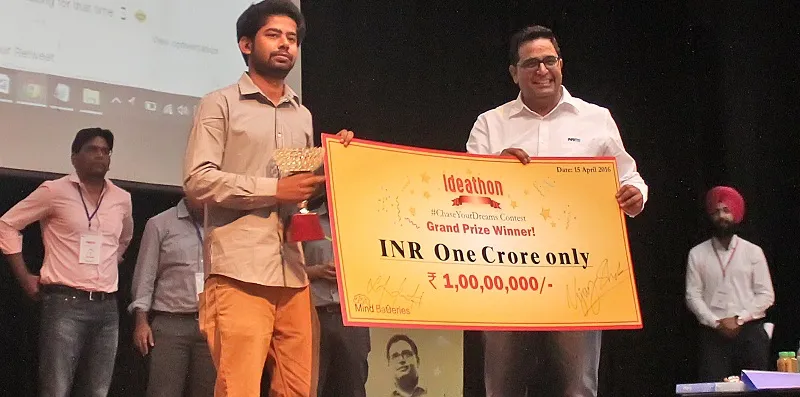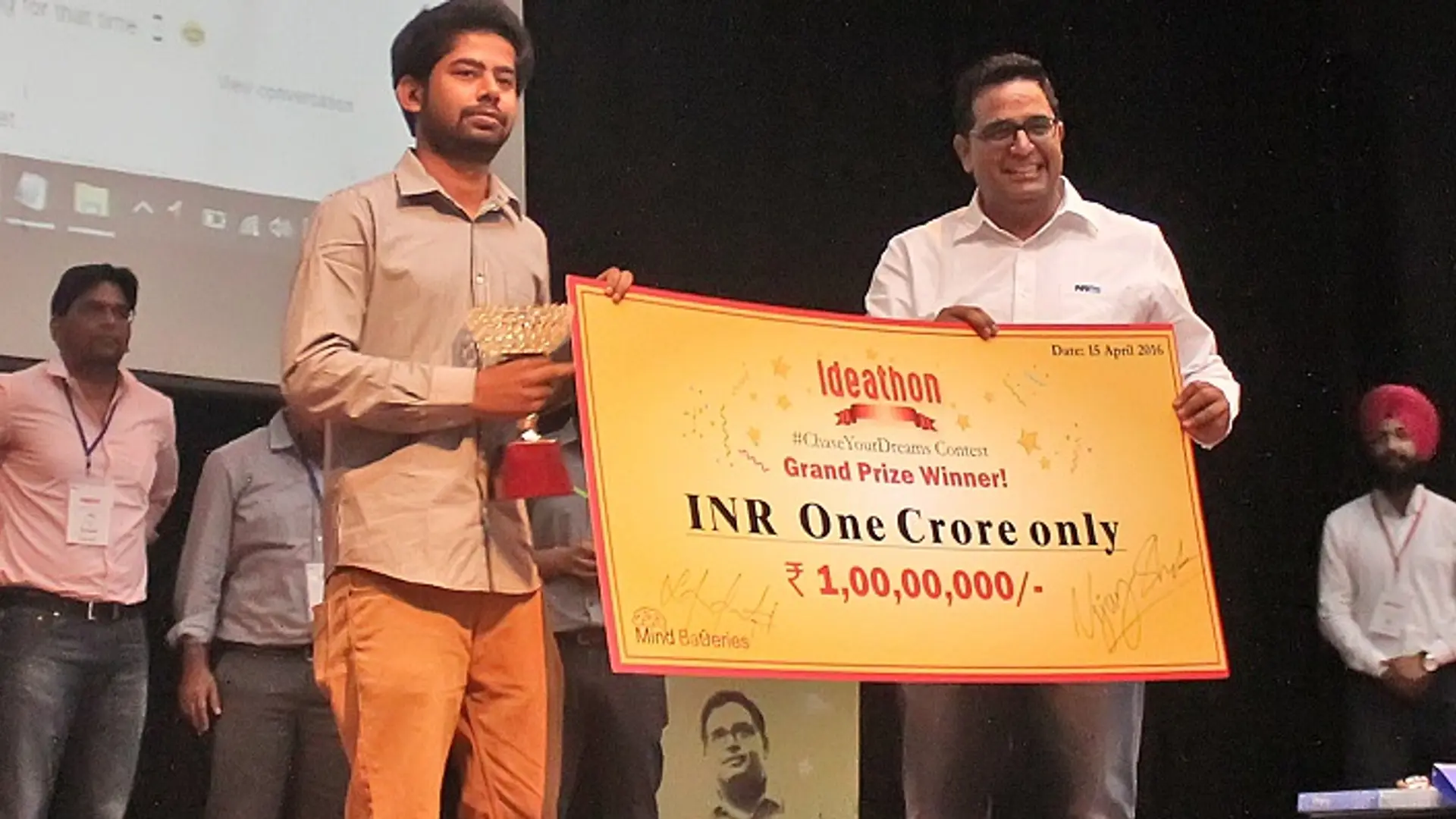How a unicorn founder backed us in 5 minutes

For us as a team, it's largely been about survival for the past 18 months and continuing to have the opportunity to do what we really love. We sold our previous product in June2015 with the same thought process and grew it in the months to come. Earlier this year with TapChief, once we decided to take a larger bet and go after an opportunity that we truly believed in, we realised that the same set of principles still hold dear. One where every action of the company and the product is about survival – surviving to achieve multiple short-term targets that are, essentially, small dots on the path to a greater North Star.
On April 15th, 2016, TapChief was selected as the winner of the Mind Batteries Ideathon contest from among 1,200 startups in India. This meant that we now had access to mentoring and a one crore investment from one of India's marquee entrepreneurs, Vijay Shekhar Sharma, of Paytm. Many have asked how we did this with a product that had been live for only 50 days or so. Here are some things that I believe worked in our favour.

1. Clarity about our business
When Brian was asked about how he managed to become a world-class CEO despite having little entrepreneurial experience (he plunged into Airbnb right out of design school), he said that rather than trying to learn everything, he spent his time finding that one best person from whom he could learn crucial skills. He said,
If you pick the right source, you can fast-forward.
This philosophy is largely what TapChief is all about. We believe that there is something to learn from everyone out there and we try to do this at scale by enabling seamless connections to professionals via phone calls across 6,000+ skill-sets, representing 1,500+ organisations, and we are growing quickly!
2. Validating our core assumptions
While everything sounds great in theory, nothing can be a better validation for your product if you, as a founder, and your team validate the core assumptions on which your product hinges. I spoke to various entrepreneurs, investors and other folks in the ecosystem to try to understand if our product actually adds value. Folks like Bharat Sethi, Aakrit Vaish, and Gaurav Munjal all acted as great sounding boards in our thought processes. I even took 25+ calls as a TapChief Expert to understand the equation from the other side of the table and see if I could add value based on the few things that I had learnt so far.
The above conversations gave us a deeper understanding of the various improvements that were needed in our approach and helped us to make necessary tweaks as we went along. It's a continuous process and we have a long way to go. However, understanding that and being on your toes with your product, once you have validated your thesis, is a crucial step.
Also read: How we built and sold a company while still in college
3. Playing to our strengths
My favourite cricketer of all time, Rahul Dravid, is one of the greatest batsmen that the world has ever seen. This has been widely attributed to his batting style that was ‘by the book’, where not a single stroke played was a bad cricketing shot. If we try to understand the reasoning behind this, Dravid in his early days flourished as a test cricketer because of his sound technique. His transition into an ODI cricketer was a manifestation of his adaptive nature, where he used his strengths to play pure cricketing shots and yet keep the scoreboard ticking. He amassed 10,000 runs by the end, by sticking to his strengths.
Our strength all along has been our ability to build beautiful products, and iterating and constantly innovating on that front. We did the same with TapChief. It took us six weeks –from our first line of code to going live – which was a target that we had set for ourselves. This gave us immense room to experiment and address our users’ needs consistently with daily code pushes.
4. Woodpecker + Moneyball
A common mistake that a lot of companies make with products is taking their eyes off the core metrics that drive both the product and the business. Another common mistake is chasing these metrics with the path of least resistance early on. For instance, paid marketing and needless PR are some of the paths of least resistance.
Also read: Are you making these deadly mistakes? 5 sure-shot ways to kill your startup
Like the movie Moneyball suggests, one doesn't need to spend money on superstars to achieve greatness. Being capital efficient and yet keeping an upward trajectory on the metrics that matter is the right way to go.We made a conscious decision to NOT spend any marketing dollars and instead explore various channels and growth hacks that could grow our primary metric: the number of calls. A combination of intuition, credible outreach, technology and the constant hunger to experiment, ensured that we were able to build a community of 3,000+ users by generating credible and relevant traffic in less than 60 days. The same thesis enabled us to have paying customers from day one.
People paying for what you build, without any spend on customer acquisition, is one of the strongest suits of armor that you can build for your product.

5. Long term impact >>short term fizz
While we managed, with Vijay Shekhar’s backing, to achieve some credible metrics within 60 days of launching TapChief, it's been mostly a byproduct of the effort that has gone into multiple products over the past 18 months. Over this period, each small skill, hack or relationship that we have built has, in some way, contributed to the marginal success that we have seen thus far and I am largely grateful for each of those experiences – not just for myself but for my team as well.
6. Investing in our people
The one thing that I consistently tell everyone who I meet and in public forums, is about our ability to have built a great team out of a small desert town called Pilani. There has been zero attrition over the past 18 months with everyone working with the same or greater conviction than when we started.
Focusing on the inner scorecard has helped us a great deal. Most of our growth hacks fell into place because we consciously tried to eliminate or replace work that someone on the team absolutely hated doing. As a monthly practice, we continue to ask ourselves about which part of our job we love and which parts we hate. The rest of the team then explores opportunities to eliminate or replace what someone else hates doing.
Related read: The changing dynamics of startup recruitment

What we have seen is that growing against our own benchmarks continuously is far more motivating than focusing on potential competitors and all the noise that’s out there. The rest of the world will inevitably see potential in the team that continues to be one of the foremost reasons for receiving venture capital.
I am proud of the incredible team that we have in place to chug away at our vision with pinpoint precision because we truly believe in the fact that great teams build great ideas and not vice-versa. If you think you could add value to the TapChief team, feel free to write to us.
While the above anecdotes largely serve as broad pointers for taking off, each scenario and situation demands a fresh perspective and these can merely be a couple of cornerstones of your journey. So if there is a specific area or problem where I can help, I am always happy to take a TapChief Call.
(Disclaimer: The views and opinions expressed in this article are those of the author and do not necessarily reflect the views of YourStory.)
You may also like: Life lessons from an unassuming internship







